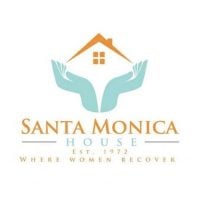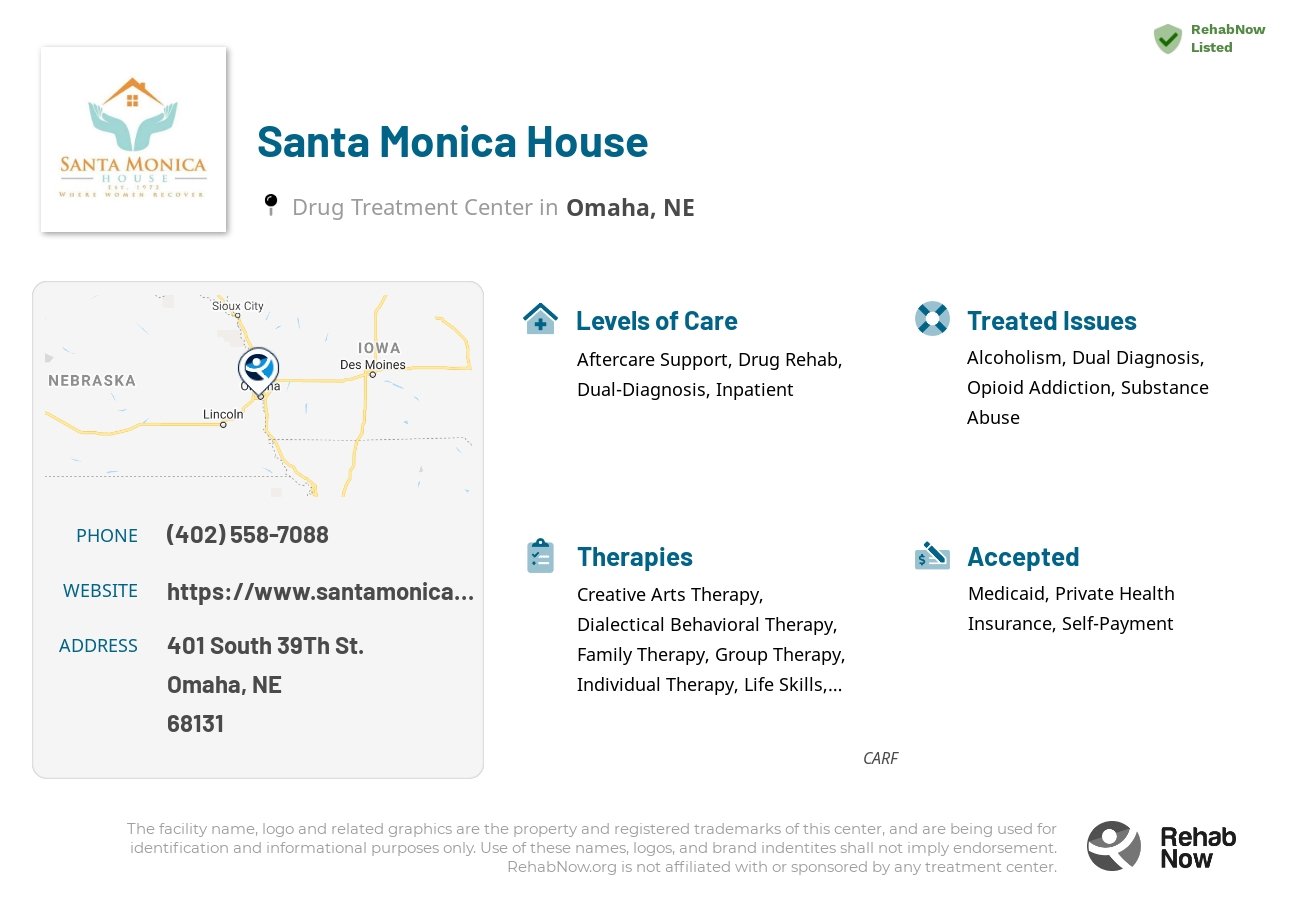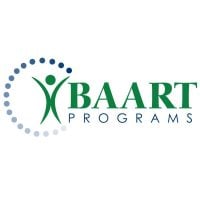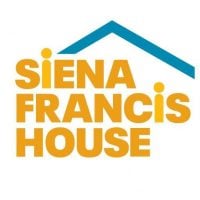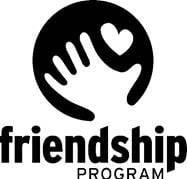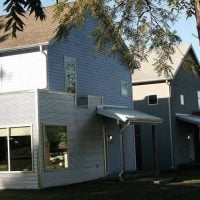Santa Monica House
Drug Rehab Center in Omaha, Nebraska
Santa Monica House is an accredited and top-rated addiction treatment center located in Omaha, Nebraska that has been providing quality, comprehensive care for individuals struggling with substance abuse since 1972, offering a variety of levels of care, including inpatient and aftercare support. It accepts private health insurance and provides 16 beds for those in need of assistance.
About Santa Monica House in Nebraska
Santa Monica House, located in Omaha, Nebraska, has been providing a caring and comprehensive program for women seeking freedom from addiction since 1972. It was the first halfway house in the area designed exclusively for women, established with a $10,000 grant from John Kenefick, the then-President of Union Pacific Railroad.
Santa Monica House offers a holistic treatment experience that utilizes proven practices to improve women's mental, physical, and spiritual health. Their approach focuses on empowering women to live without the burdens of addiction.
Accredited by CARF (Commission on Accreditation of Rehabilitation Facilities), Santa Monica House provides a range of treatment options, including a Halfway House program, a step-down level of care to a ¾ way house, and a 10-unit apartment building for women and children. Their services encompass aftercare support, drug rehab programs, and dual-diagnosis treatment, catering to various needs.
- Pioneering women's addiction treatment since 1972
- Holistic approach addressing mental, physical, and spiritual well-being
- Continuum of care from Halfway House to independent living
Santa Monica House specializes in treating alcoholism, opioid addiction, substance abuse, dual diagnosis, and drug addiction among women.
Genders
Ages
Modality
Additional
Accreditations

CARF
The Commission on Accreditation of Rehabilitation Facilities (CARF) is a non-profit organization that specifically accredits rehab organizations. Founded in 1966, CARF's, mission is to help service providers like rehab facilities maintain high standards of care.
Conditions and Issues Treated
Substance abuse creates problems that affect people in Omaha, NE on many levels. First, substance abuse affects the individual who is abusing drugs or alcohol. This can result in health problems, including heart damage and overdose. Substance abuse also affects the user’s family, friends, co-workers, classmates, or peers. These people feel frustrated because they do not know how to help their loved ones struggling with addiction. At the same time, the addict cannot control his behavior. Lastly, friends and family members of addicts are affected financially by substance abuse.
The good news is that effective treatments can help prevent substance abuse or treat its effects on the user. These treatments, which include behavioral therapy and counseling sessions, target the underlying causes of substance abuse, helping users achieve sobriety so they can regain control over their lives. They also teach users to cope with stress in ways other than using drugs or alcohol.
Opioid addiction has become a significant health problem in the United States. When a person’s life becomes unmanageable because of an opioid addiction, treatment can help them get sober. Treatment includes medical care and counseling.
“With so many people struggling with opioid addiction, we need more care and attention for those who want to quit. Opioid addicts often take opioids when they experience a painful injury – that’s how the cycle starts! When someone begins taking their medication differently than prescribed or takes an excessive amount of drugs, it means they’re hooked on drugs and in danger of overdosing.
The most successful way to beat this is through detoxing from these types treatments at Santa Monica House in . Most facilities start by using medical support during the process while providing counseling services; rehabilitation comes later on after treatment has been completed successfully.
A “dual diagnosis” is when the individual has two medical issues at the same time. The top co-occurring mental disorders with addiction are depression, anxiety, ADHD, bi-polar disorder. Addiction is also considered a mental illness that is not a choice but rather a medical condition. Addiction can be caused by any number of underlying issues.
Dual diagnosis is provided by Santa Monica House to treat addictive tendencies as well as any untreated mental illnesses. This ensures successful long term health and recovery for patients after treatment has been completed.
Dual diagnosis is provided by Santa Monica House to treat addictive tendencies as well as any untreated mental illnesses for people in Nebraska. This ensures successful long term health and recovery for patients after treatment has been completed.Levels of Care Offered
This center offers a variety of custom treatment tailored to individual recovery. Currently available are Aftercare Support, Drug Rehab, Dual-Diagnosis, Inpatient, with additional therapies available as listed below.
Going to an inpatient rehab facility means living there while all aspects of addiction or co-occurring disorder get addressed. The treatment involves medical supervision, therapy, and future planning.
This type of rehabilitation provides a drug-free environment for people who struggle with chronic/long-term addiction without having access to drugs outside the center (or their own home). It takes away any distractions because they live there 24 hours per day. If someone is trying to break out old habits, which could lead them back into substance abuse, things like jobs or school can be put on hold until after they complete their stay to focus solely on recovery.
Without aftercare support, addicts can easily relapse back into addiction. It is crucial to integrate the addict back into society. Aftercare support should take place after outpatient treatment has ended.
There are a few different types of aftercare support that patients can seek after completing an inpatient treatment program:
- 12 Step Self-help groups (AA, NA)
- Therapeutic communities,
- Long-term, structured sober living arrangements
- Halfway houses (residential treatment centers)
Many different support groups exist for addicts to seek help after treatment. Some are more effective than others, depending on the person’s addiction, background, and other factors.
Therapies & Programs
Individual therapy is a form of counseling where you meet with a trained professional one-on-one. Meeting with a therapist in this setting allows for a personal and trusting relationship to be built. This allows the patient to open up about sensitive or private issues they may not feel comfortable discussing in a group. Individual therapy helps identify the root causes of your addiction, which can help prevent relapse.
Family therapy is often done alongside drug treatment to help addicts stay sober. The goal of family therapy for drug addiction is to create an environment where communication can happen without judgment, hostility, or blame. The therapist will sit with the family so they can learn how to communicate differently and provide new tools for dealing with emotions so that people don’t want to drink or do drugs. It’s important for families to focus on relapse prevention plans during treatment so that if the addict feels like they want to use again, they’ll know what steps they need to take together to prevent it from happening again in the future.
Group therapy sessions are another common addiction recovery service. These group sessions typically involve six to 12 addicts who meet regularly with a trained professional for support and guidance.
During these sessions, the group shares their experiences with one another and provides feedback that can help each member avoid relapse or overcome specific obstacles they are facing in their recovery process. With this type of support and guidance, addicts can feel like they are part of a community that understands their struggles and will help them get through the hard times.
Many people struggling with drug addiction have experienced some form of trauma in their lives. It is crucial that these individuals seek out professional help; otherwise, their drug abuse and addiction will likely continue.
Therapists and counselors at drug treatment centers employ several treatment programs to help people struggling with drug addiction, including trauma therapy. Trauma therapy helps people dealing with addiction by allowing them to confront the traumas of their past and move past them.
It is important to note that trauma therapy should not be confused with PTSD (post-traumatic stress disorder). Rather, it is used to treat the effects of trauma, which are often at the root of addiction.
Dialectical Behavior Therapy was developed in the 1980s to treat chronically suicidal individuals. It is a cognitive-behavioral therapy that combines standard DBT with strategies derived from Zen Buddhism, such as mindfulness training.
DBT has been adapted for use with other types of psychiatric problems, including eating disorders, substance abuse disorders, borderline personality disorder, posttraumatic stress disorder (PTSD), and other personality disorders. Dialectical Behavior Therapy is considered a psychosocial treatment of BPD. This means that while it can be used alone or in conjunction with drug treatments, DBT does not rely on medications to treat the disorder. Instead, DBT aims to help patients change their thinking and behavior.
It’s not as simple as quitting drinking or using drugs and expecting the hard part to be over. Many addicts in recovery have discovered that they need to improve skills such as time management, organization, communication, socialization, and self-esteem. Learning certain life skills can help those who are struggling with addiction.
The 12-step program is one of the most common forms of addiction treatment today. It consists of attending meetings and working with a sponsor to follow the 12 steps outlined by Alcoholics Anonymous (AA). The 12-step program was created to assist alcoholics in getting sober and staying clean. However, it is now used for a variety of addictive substances. The 12-step program encourages addicts to completely give up their former lifestyle, which is not always practical or possible for everyone.
It is essential to remember that abstinence from drugs and alcohol is the only way to ensure long-term sobriety.
12-Step programs can be beneficial for some people, but it all depends on the individual and whether or not they’re capable of completely giving up their addiction. This method is not for addicts who are unwilling to or have no desire to quit using and so is best utilized when paired with other treatment methods.
Payment Options Accepted
For specific insurance or payment methods please contact us.
Is your insurance accepted?
Ask an expert, call (888) 674-0062
Additional Details
Specifics, location, and helpful extra information.
Omaha, Nebraska 68131 Phone Number(402) 558-7088 Meta DetailsUpdated April 15, 2024
Staff Verified
Santa Monica House Patient Reviews
There are no reviews yet. Be the first one to write one.
Omaha, Nebraska Addiction Information
Despite a total population of slightly less than 2 million residents, methamphetamines are one of the most commonly abused illicit substances in the state. Alcohol abuse is so common that a news article once referred to Nebraska as "America's 9th drunkest state". Although opioid abuse rates in Nebraska are not as high as those in other states, opioids are still involved in most overdoses.
Omaha, NE has been hit hard by drug addiction and abuse in recent years. About 5% of the population is addicted to drugs or alcohol. Marijuana is the most commonly abused drug in Omaha. In 2017, there were 936 people admitted to treatment centers for marijuana abuse. Crime rates have gone up, and there have been more cases of child abuse and neglect.
Treatment in Nearby Cities
- Omaha, NE (1.9 mi.)
- Falls City, NE (85.0 mi.)
- Kearney, NE (166.9 mi.)
- Macy, NE (62.5 mi.)
- Sidney, NE (364.6 mi.)
Centers near Santa Monica House
The facility name, logo and brand are the property and registered trademarks of Santa Monica House, and are being used for identification and informational purposes only. Use of these names, logos and brands shall not imply endorsement. RehabNow.org is not affiliated with or sponsored by Santa Monica House.
